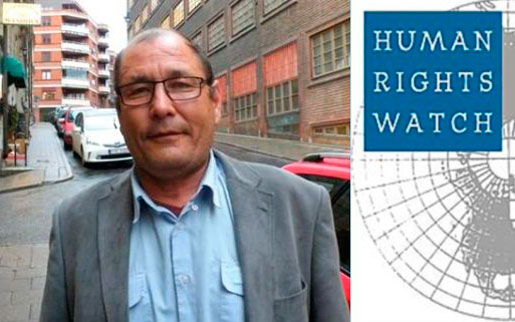Human Rights Watch calls on Prosecutor General of Belarus not to extradite Turkmen journalist
Human Rights Watch has written to Belarus’ Prosecutor General Aliaksandr Kaniuk, asking him to ‘immediately release’ journalist Chary Annamuradov, whose extradition has been sought by Turkmenistan.
Annamuradov was arrested on July 19, when he arrived at Minsk airport.
The Prosecutor General’s Office is expected to announce its decision on Annamuradov’s extradition in late September.
Human Rights Watch says that Annamuradov worked as an independent journalist in Turkmenistan in the 1990s but had to flee the country in 1999 due to persecution and obtained asylum in Sweden in 2003. He has both Swedish and Russian citizenship and continued to work as a journalist until 2008.
The Turkmen authorities are seeking Mr. Annamuradov’s extradition on charges of fraud and bribery filed in 2006, under p. 4 of Article 228, p. 2 of Article 185, and Article 33 of the Criminal Code of Turkmenistan. He is currently held at a pretrial facility SIZO-1 in Minsk.
“Our belief that Annamuradov would face persecution and torture if returned to Turkmenistan is grounded in several decades of monitoring and documenting the human rights situation in that country,” HRW said.
According to Annamuradov’s lawyers, the extradition request against him by Turkmen authorities is based on the Minsk Convention on Legal Aid and Legal Relations in Civil, Family, and Criminal Cases of 1993 and in accordance with the Criminal Procedural Code of Belarus. The 1993 Minsk Convention does not allow for a judicial review of the legality of detention.
Considering this, Human Rights Watch refers to international law of human rights and the Belarusian legislation, including provisions on the principle of non-refoulement.
“The principle of non-refoulement, articulated in international refugee law and human rights law instruments, establishes an absolute prohibition on the forced removal of a person to another state where there are substantial grounds for believing that the person would be in danger of being subjected to torture of other cruel, inhuman or degrading treatment or punishment.
Article з of the Conventional against Torture and Other Cruel, Inhuman or Degrading Treatment or Punishment (CAT), to which Belarus is a state party, provides that no state shall expel, return (“refouler”) or extradite a person to another state where there are substantial grounds for believing that he or she would be in danger of being subjected to torture. To make such determinations, the CAT requires states to examine all relevant factors, including a consistent pattern of gross or flagrant violations of human rights in the country in question. Article 7 of the International Convention on Civil and Political Rights (ICCPR) also prohibits deportation of a person to a country where he faces a real risk of torture or “cruel, inhuman or degrading treatment or punishment.” Following the principle of non-refoulement, states are prohibited from removing individuals protected by the 1951 Convention Relating to the Status of Refugees and its 1967 Protocol. In international law, a refugee is defined as a person who, “owning to well-founded fear of being persecuted for reasons of race, religion, nationality, membership of a particular social group or political opinion, is outside the country of his nationality and is unable, or owning to such fear, is unwilling to avail himself of the protection of that country [...].” The Convention prohibits the return of refugees to a territory where the refugee’s life or freedom may be threatened: “No Contracting State shall expel or return (“refouler”) a refugee in any manner whatsoever to the frontiers of territories where his life or freedom would be threatened on account of his race, religion, nationality, membership of a particular social group or political opinion.”
Guided by these international standards, Human Rights Watch asks Mr. Kaniuk to ‘desist from extraditing or otherwise returning’ Annamuradov in Turkmenistan, and ‘release him from custody so that he can return to Sweden.’


















